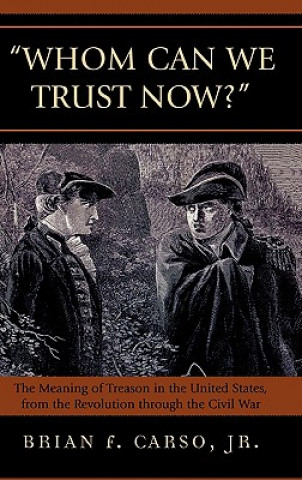
Kód: 04902336
Whom Can We Trust Now?
Autor Brian F. Carso
For several hours in August 1787, the delegates to the Philadelphia Convention debated the two sentences defining treason that would serve as the only criminal law in the U.S. Constitution. As storied and controversial as this anc ... celý popis
- Jazyk:
 Angličtina
Angličtina - Väzba: Pevná
- Počet strán: 262
Nakladateľ: Lexington Books, 2006
- Viac informácií o knihe

Mohlo by sa vám tiež páčiť
-

World's Best Sailboats
65.03 € -10 % -
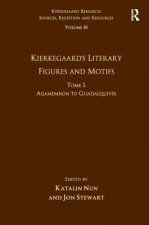
Volume 16, Tome I: Kierkegaard's Literary Figures and Motifs
217.50 € -
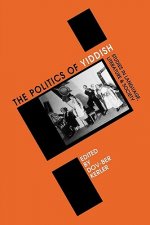
Politics of Yiddish
70.35 € -

Aromatherapy
20.65 € -10 % -
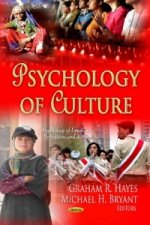
Psychology of Culture
246.55 € -12 % -
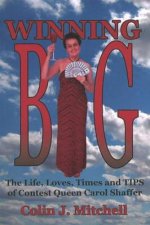
Winning Big
23.92 € -
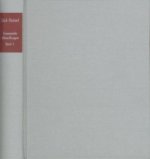
Erich Heintel: Gesammelte Abhandlungen / Band 3: Zur Theologie und Religionsphilosophie I
69.63 €
Darujte túto knihu ešte dnes
- Objednajte knihu a vyberte Zaslať ako darček.
- Obratom obdržíte darovací poukaz na knihu, ktorý môžete ihneď odovzdať obdarovanému.
- Knihu zašleme na adresu obdarovaného, o nič sa nestaráte.
Viac informácií o knihe Whom Can We Trust Now?
Nákupom získate 431 bodov
 Anotácia knihy
Anotácia knihy
For several hours in August 1787, the delegates to the Philadelphia Convention debated the two sentences defining treason that would serve as the only criminal law in the U.S. Constitution. As storied and controversial as this ancient crime was, the meaning of treason for the new democratic republic was difficult to foresee. Historian and lawyer Brian Carso demonstrates that although treason law was conflicted and awkward, the broader idea of treason gave recognizable shape to abstract ideas of loyalty, betrayal, allegiance, and political obligation in the United States. Taking an interdisciplinary approach, Carso begins by exploring the nature of loyalty and betrayal in a democratic republic, using examples ranging from Socrates in Plato's Crito to the dilemma of Robert E. Lee in 1861 and the trial of Timothy McVeigh in 1997. Turning to legal history, the study considers the historical antecedents of the Treason Clause of the U.S. Constitution and examines the utility of American treason law as it was applied in a variety of cases, most notably in the 1807 trial of Aaron Burr, in which Supreme Court Justice John Marshall used twenty-five thousand words to explicate the Treason Clause. Finding that the antinomies of treason law in a democratic republic make successful prosecutions against treason nearly impossible, Carso turns to the political, intellectual, and cultural realms of civic life to identify and to explain the broader meaning of treason. The study investigates the perpetual condemnation of Benedict Arnold and the many ways treason animated civic discourse during the Civil war. By examining editorials, sermons, histories, orations, art, literature, and political cartoons, Carso identifies how the meaning of treason engaged the public imagination in a variety of compelling forms and instructed citizens on loyalty and betrayal outside the courtroom as much as within it.
 Parametre knihy
Parametre knihy
Zaradenie knihy Knihy po anglicky Humanities History Regional & national history
174.35 €
- Celý názov: Whom Can We Trust Now?
- Podnázov: The Meaning of Treason in the United States, from the Revolution through the Civil War
- Autor: Brian F. Carso
- Jazyk:
 Angličtina
Angličtina - Väzba: Pevná
- Počet strán: 262
- EAN: 9780739112564
- ISBN: 0739112562
- ID: 04902336
- Nakladateľ: Lexington Books
- Hmotnosť: 631 g
- Rozmery: 237 × 163 × 24 mm
- Dátum vydania: 25. May 2006
Obľúbené z iného súdka
-

Hundred Years' War on Palestine
12.06 € -24 % -

Ethnic Cleansing of Palestine
14.41 € -23 % -

History of Japan
16.35 € -19 % -

Ten Myths About Israel
13.59 € -14 % -

Strange Death of Europe
16.56 € -23 % -

Decline and Fall of the Roman Empire
5.92 € -21 % -

Secret History
12.26 € -23 % -

God's Playground A History of Poland
68.71 € -

Mayflower
15.74 € -23 % -

How to be a Victorian
14.41 € -23 % -

Plantagenets
13.18 € -29 % -

General's Son
20.24 € -4 % -

Iran: A Very Short Introduction
8.99 € -31 % -

Temples of Karnak
153.59 € -

Cuneiform
11.14 € -23 % -

Twenty Years A-Growing
10.11 € -23 % -

History of Witchcraft in England from 1558 to 1718
19.01 € -

China in Africa
37.42 € -

Bohemian Paris
16.56 € -18 % -

Islandman
10.11 € -23 % -

Alexiad
17.78 € -20 % -

Lancaster And York
22.90 € -

Inside Hitler's Greece
20.75 € -14 % -

Modern France: A Very Short Introduction
9.40 € -34 % -

Diana: Her True Story - In Her Own Words
11.03 € -23 % -

The Fourth Turning
19.52 € -6 % -

The Oxford History of Ancient Egypt
15.53 € -23 % -

Churchill: The Power of Words
15.12 € -22 % -

Palestine
20.24 € -20 % -

Korean History in Maps
28.01 € -10 % -

Great Gatsby (Wisehouse Classics Edition)
16.15 € -37 % -

Viking Way
46.21 € -7 % -

The Thirteenth Tribe
12.57 € -

My Promised Land
20.85 € -23 % -

Vanished Kingdoms
18.81 € -22 % -

Age Of Revolution
16.56 € -23 % -

Life and Death of Anne Boleyn
23 € -

Coming of the Third Reich
18.70 € -23 % -

Children of Ash and Elm
16.97 € -22 % -

Europe Between the Oceans
34.15 € -7 % -

Socialism Betrayed
19.62 € -18 % -

303 Squadron
22.90 € -2 % -

Ancient Celts, Second Edition
26.89 € -18 % -

Dancing in the Glory of Monsters
15.74 € -23 % -

Battle of Britain: Luftwaffe Blitz (Images of War)
25.86 € -1 % -

Age of Confucian Rule
35.99 € -

Beyond Band of Brothers
16.56 € -23 % -

Benjamin Franklin
18.70 € -13 % -

On China
17.17 € -21 %
Osobný odber Bratislava a 2642 dalších
Copyright ©2008-24 najlacnejsie-knihy.sk Všetky práva vyhradenéSúkromieCookies



 21 miliónov titulov
21 miliónov titulov Vrátenie do mesiaca
Vrátenie do mesiaca 02/210 210 99 (8-15.30h)
02/210 210 99 (8-15.30h)